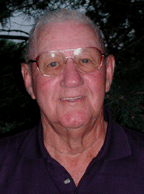 |
Politics make strange bedfellows. You can say the same for baseball.
Just ask Eugene Davis. A spellbinding southpaw
in his youth, Gene—as he likes to be called—went undefeated
for Northern Illinois State Teachers College in 1950, delivering
a championship trophy to the school now known as Northern Illinois
University.
Though he
didn't have the pedigree to be a big leaguer (he went ont
to teach grade school and later became superintendent of elementary
schools in Grayslake, Illinois), Gene enjoyed a satisfying career
in semi-pro ball. Along the way, he had more than one brush with
fame, rubbing shoulders with the likes of Ronald Reagan and Eddie
Gaedel.
Gene sat down
with JockBio contributing editor Susan McKenna to talk about his
many years in baseball.
|

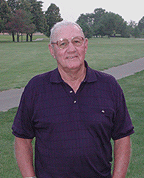
Gene Davis
|

When were
you first interested in playing baseball?

Well, I can't remember the first time I played, but I must have
been about four- or five-years-old. Our next-door neighbor in
DeKalb was a school principal, and he brought all the equipment
home from the local school so my three brothers and the neighborhood
kids could play in a vacant lot nearby.
|
|

You played
with the “big boys” when you were just a young guy.
Tell us about that.

When I was 13, I was invited to try out for the town's baseball
team, which played in a Sunday night league. We didn't even have
a telephone at home, so someone came to our front door o talk
to me about it. Apparently I had something they needed because
I made the team. I played with a group of guys in their 20s, 30s
and 40s. We all played for the fun of it, but those guys also
used to play for a barrel of beer. I drank a lot of orange pop
in those days.
|
|

Did you play
any other sports?

Yes, I also played fast-pitch softball and football. My dream
was to be a high school football coach.
|
|

How did you
get into college baseball?

After graduating high school, I started at Northern in the fall
of 1942. I intended to get my education degree, teach school and
coach football. But I didn't even get through the first
term. While playing football, I got banged up a little, and a
few months after that I left school. I made the baseball team
several years later when I returned to college after the war.
|
|

So you dropped
out of college. What did you do next?

A friend and I cooked up this plan. I told my mom that I was going
to drop out of school, go to Pennsylvania and work in the shipyards
for a while with my buddy, which we did from October to December
1942.
The
war had been going for awhile and I had wanted to join the Marines
before I started college, but I didn't pass the physical.
I don't know why exactly but suspect it was my eyesight
that kept me out. In December of 1942, however, the Navy was willing
to take me. I knew I'd be drafted if I didn't enlist,
so I became a Seabee and in September of 1943 I found myself stationed
in the Aleutian Islands.
|
|
| 
You were fortunate
to get through your stint in the service without serious injury,
weren't you?

I had a few close calls and some interesting times. In 1943 I
was a third-class petty officer—essentially a glorified
stevedore—loading and unloading ships. At one point, I stood
gun watch on a ship taking cargo to Amchitka (one of the Aleutian
Islands in the middle of the Bering Sea between Russia and Alaska).
While in San Francisco on leave in the summer of 1944, I was knocked
out of my bunk by an explosion across the bay in the Port Chicago
shipyard (known as the Port Chicago Disaster), where 320 men were
killed.
Later
on, while loading ammunition in Oregon, we were using a winch
and cables to move palettes that contained 5-inch artillery shells.
One day, a cable went slack and the stack of shell cartons started
swinging and hit the liner of the cargo opening. I was down in
the hatch and the stack of cartons was about 100 feet above my
head. I did the only thing I could think of: I took two steps
away from the opening and plugged my ears. Luckily, nothing exploded.
I'll never forget seeing those shells above my head.
In
August 1945, I was on a ship headed for the invasion of Japan,
but the atomic bomb ended that mission.
At
one point during the war, my mother was really worried because
three of her four sons were in the military stationed at remote
points around the world.
|
|

Shortly before
you were discharged, you had an opportunity to play baseball again,
right?

Yes, we were standing at attention one day and the recreation
officer came by and said, “Any of you who play baseball,
take one step forward.”
I
was among a small group who took a step. He came up to me and
said, “Just tell me you're a left-handed pitcher,”
and, of course, I said I was. A week later I was in Okinawa pitching
against the Marines.
One
memory from that time is when a guy built like a fireplug came
up to bat. I thought I could get him out for sure, but he hit
a ball off of me that I think is still going.
The
fact that the rec officer was also the personnel officer was fortunate
for me because he promised to send me home as soon as possible,
and he made good on his word. I came home in December 1945.
|
|

What did you
do when you got back?

Before I could get back into college, I had to take a job for
a while so I went to work hand-polishing pianos at Wurlitzer.
I got really good at it, and I kept at it through my first year
of teaching. I started at Northern again in the fall of 1946,
and was able to get credits for some courses because of my military
experience.
In
1947 I met my wife in the Log Cabin, a campus bar, and married
her the following year. Since I was a new husband and a college
student, I couldn't afford to go out for a sport for the first
two years. In my second year, I decided I ought to earn a letter
so I went out for baseball and was one of seven or eight pitchers
on the team.
|
|

Tell us about
your famous coach.

Our coach was the late Ralph McKinzie, who also served as Northern's
basketball coach. But he's probably most famous for being the
late President Ronald Reagan's football coach at Eureka College.
(Reagan played there from 1928-1931.) Reagan thought a lot of
his coach and stayed in touch with him until McKinzie died in
1990.
We've
held a reunion every year since 1970 at various locations around
the country. Bill Eiserman, my catcher in1950 and our team captain,
always liked to point out our unusual set of circumstances: a
group of GIs going to school on the GI Bill. We were all going
to be teachers, and we were older and more mature than most students.
Our reunions are a way to get together with the team and play
a little golf.
Bill
sent an invitation to Reagan every year and always got a reply.
I've got copies of some of his letters and notes from the late
1980s.
|
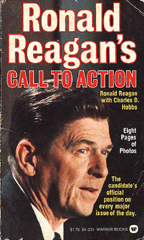
Ronald Reagan book |

President
Reagan had a good sense of humor. One his letters included a sticky
note with the printed message, “In the event of a nuclear
war, disregard this message.”

He sent that to Bill along with a message for Coach Mac. Bill
received letters on White House stationery and even got a phone
call at home once. That letter to Mac was shared with the rest
of us. In it, President Reagan wrote, “Tell all those ball
players you are with, the ‘Gipper' is grateful to
them for honoring you. I don't know of anyone more deserving than
you. You were a major influence in my life and I'm forever grateful.
And I know they feel the same way.”
President
Reagan even sent a check to the Ralph McKinzie Memorial Fund in
support of our team's effort to name the Northern baseball field
after Coach Mac. When the coach retired, we all got to meet Reagan
and his wife, Nancy. He was governor of California then, but he
took the time to come to DeKalb and give a speech. We considered
him a member of our team.
|
|

That's not
your only brush with fame. Tell us about your time in the semi-pro
leagues in Northern Illinois.

I was teaching fifth grade in Plano, Illinois, and I heard about
a semi-pro team, the Moose in nearby Sycamore, that was looking
for a pitcher. Apparently I fit the bill. They paid me about $15
to $20 a game, which helped buy us a few groceries. In September
1951, Eddie Gaedel was part of a Bill Veeck scheme to bring publicity
to the St. Louis Browns. Gaedel appeared in one game, in one at-bat,
as a pinch hitter for the Browns. Since his strike zone was so
small, he was expected to draw a walk easily. He did just that
in a game against Detroit.
A
week later he was on a barnstorming tour of Northern Illinois
and he showed up in a game we were playing against the Sycamore
Suns. I had heard that he might make an appearance, but I never
thought anything of it. I was just concerned with getting another
out.
|
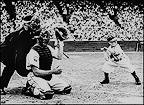
Eddie Gaedel photo
|

What happened?

I struck him out in three pitches.
|
|

What kind
of reaction followed?

A national
news service ran a story on it the next day, saying, “Well,
it had to happen sometime.” The DeKalb Daily Chronicle
also printed a small story, which read, “It took the Sycamore
Moose to prove it but they showed that little Eddie Gaedel was
no menace to pitchers. Gene Davis, Moose southpaw, fired three
pitches right through the strike zone of the famous Browns' midget
last night to become the first pitcher to ever strike out the
three foot, seven inch giant.”
After
the game, the team used to go to the Moose Lodge for a beer before
heading home, and Gaedel joined us that night. But, when our manager,
Doug McLean, tried to get him together with me for a photo, Gaedel
refused, saying, “No. He ruined my career.”
|
|

Sounds like
you just took this all in stride.

Well, one of my sons-in-law had been in our family for five or
six years before he ever heard this story.
|
|

Sounds like
you just took this all in stride.

Well, one of my sons-in-law had been in our family for five or
six years before he ever heard this story.
|
|

What did
you think about Bill Veeck's publicity stunt with Gaedel?

I know he was seen by some as a showman, but he also did so many
good things for baseball. He and his dad had the ivy planted at
Wrigley Field. And, after he bought the White Sox, he added the
first exploding scoreboard in the major leagues. But, of course,
then there was also “Disco Night.”
|
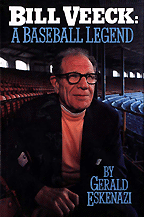
Bill Veeck book
|

Did anyone
from your Sycamore team go on to play in the major leagues?

A few guys went to the minor leagues and signed contracts, but
most didn't stay too long. It was talent more than anything that
kept them out.
I
talked to a couple of scouts. One was from the Chicago White Sox.
His first question to me was, “Do you need to wear those
glasses?” The answer was, “Yes.” His second
question was, “How old are you?” When I told him 26,
the interview was essentially over.
|
|

You still
follow the game today. What do you think about hitting—how
come no one can hit .400 anymore?

Well, Ted Williams used to credit his hitting to his great eyesight.
Today, pitchers can throw the ball 90 mph or faster. Players are
younger, stronger, bigger, faster and just better trained. And
a good ballplayer works at it.
|
|

You've
been around for a lot of great sports moments. Which ones stand
out in your memory?

I saw the College All-Star football game when Jackie Robinson,
Tom Harmon and his Michigan teammate, Forrest Evashevski, played
at Soldier Field against the Bears. There weren't that many all-star
games back then and this was an exciting bunch of guys to watch.
Another moment is when I saw my favorite player, Gabby Hartnett,
hit the “Homer in the Gloamin'” to help get the Cubs
into the playoffs in 1938.
|
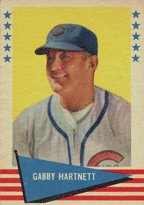
Gabby Hartnett, 1961 Fleer
|

Are you still
involved in baseball?

I used to throw batting practice occasionally to help out the
high school team when I was superintendent, and I follow baseball
as a fan, but I'm a golfer now. I got interested in golf when
I was about 26 and have been playing ever since. I was walking
across the girl's athletic field when I saw someone with a golf
club in her hand. I picked up a 3-iron and, gripping it like a
baseball bat, I hacked a shot. I was hooked.
After
my wife died in 1992, I decided to move downstate from Grayslake
to be closer to my twin daughters and their families, who live
in Champaign County. My only stipulation for my new home was that
it had to be on a golf course, so now I live on the edge of the
University of Illinois's course in Savoy.
I
play golf five days a week, usually with the same group of guys.
Every once in a while we play skins for a dime so no one ever
loses too badly.
|
|

You just
celebrated your 80th birthday on—where else?—the golf
course. How did you play that day, and what's your best score?

Well, I shot a 40 on the front nine so I was in line to shoot
my age. I was thinking, “Happy Birthday, Gene!” and
then I double-bogeyed the 10th hole.
Around
1972 I shot a 71, which was 1-under par. I got my first hole-in-one
in 1976, and have had three more in the years since then.
|
|

Recently
you returned home from the latest baseball team reunion. What
do you think keeps you coming back together every year?

The main reason was Coach Mac. He was always reminiscing, saying,
“Do you remember this or that?” He taught us that
the most important part of the baseball team was not winning championships
but the fellowship created by the players. That meant a lot to
us back then and it still does today.
|
|
|


